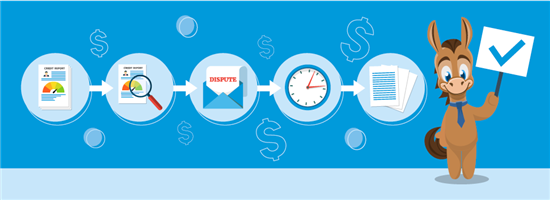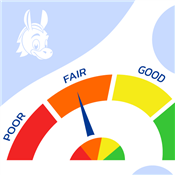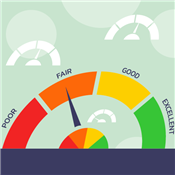How Long Does Credit Repair Take
Credit repair can take between 30 days and over a year. See five steps of credit repair and the time it takes to complete them.
 |
Let's begin with a quick definition of credit repair. Then, you'll find a step-by-step review of how long credit repair takes to complete.
What is Credit Repair?
Credit repair is the process of removing incorrect negative information from your credit report, such as late payments.
The purpose of credit repair is to increase your credit score.
A good credit score improves your chances of being approved for mortgages or auto loans. It can also help you get better terms for financing (lower interest rates and down payment requirements).
Free Online Credit Assessment
- Free Credit Score
- Free Credit Report Summary
- Free Credit Recommendation
- 5 Minutes to Check Your Credit
Get Free Consultation From Experts
- Challenges to three credit bureaus
- Score Analysis and Tracker
- 90-Day Money-back Guarantee
- No first work fee for additional family member
Get a Free Consultation Today
- Plans start at $69/month and $119 first work fee
- 60-day satisfaction guarantee
- Cancel service anytime
- Free Credit Monitoring
How Long Does Credit Repair Take: A Step-by-Step Timeline
 |
The total credit repair process usually takes between one and three months. Here is a breakdown of how long each step takes.
| Actions To Improve Your Credit | Time Required |
|---|---|
| Download Your Credit Report | 30 mins |
| Review Your Credit Report | 1 to 3 hours |
| Writing and Sending Dispute Letters | 1 day |
| Waiting for Responses | Up to 50 days |
| Optional: Follow-up Additional Documents | Up to 50 days |
| Total | 51 to 101 days |
1. Requesting and Downloading Your Credit Reports: 30 Minutes
The first step is obtaining your credit report. You can access your full credit report for free once per year at Annual Credit Report. It only takes about 30 minutes to complete.
2. Reviewing Your Credit Report: 1-3 Hours
Next, you'll need to comb through your credit report to find any information that could be harming your score. Once you have your report, carefully examine five different areas of your credit report:
- Personal Information: Includes contact information, name and former names (if applicable), phone numbers, employers, and Social Security number.
- Accounts: Will show all open accounts and some recently closed accounts from the last two years.
- Public Records: If you have ever filed for bankruptcy, that information will be located here.
- Collections: Any accounts that have been delinquent for some time and sent to collections agencies will be shown in your collections report.
- Inquiries: Hard inquiries that have been performed on your credit report will be shown here.
Carefully review all of this information. Even basic data points (previous addresses and employers) could indicate identity theft or a credit bureau error.
This process should take between one and three hours.
3. Creating and Sending Dispute Letters: 1 Day
If you have identified errors on your credit report, the next step is to draft a dispute letter. After, send it to credit bureaus where the error was found.
You can write your own dispute letter using resources available online.[1] Alternatively, using credit repair software will automatically generate dispute letters. The DIY method is free except for postage costs but will take longer. A credit repair company will expedite the process at a price.
This process will take anywhere from a few hours to one day. It depends on the number of errors and the method you choose.
4. Waiting for Responses: Up to 50 Days
The next step is a waiting game.
According to the Fair Credit Reporting Act (FCRA), credit bureaus take 30 and 45 days to investigate your dispute. Followed by five days to send you their findings.[2]
It is advisable to use USPS-certified mail when sending dispute letters. This way you can track when your letters are received.
5. Supplying Additional Documentation (optional): Up to 50 Days
It is possible that one or all major credit bureaus request additional information. In this case, you will have to repeat step 4 after sending the needed documents.
| Item Type | Time on Credit Report |
|---|---|
| Soft credit inquiry | No impact on your credit report |
| Hard credit inquiry | up to 2 years |
| Late payments, missed payments, collections, or Chapter 13 bankruptcy | up to 7 years |
| Chapter 7 bankruptcy, or Tax liens | up to 10 years |
DIY Credit Repair vs. Credit Repair Company Timeline
Choosing whether to perform credit repair on your own or pay a third party depends on your preferences.
The DIY method is free (except for postage costs). But it will take longer and will require significant time and effort on your part.
Unless you are a seasoned professional, you will spend more time doing credit repair yourself. You can expect to spend several additional days compared to hiring a company or using credit repair software.
Free Online Credit Assessment
- Free Credit Score
- Free Credit Report Summary
- Free Credit Recommendation
- 5 Minutes to Check Your Credit
However, bear in mind that credit repair companies can't do anything you can't do on your own. Whether you do it yourself or use a company, the steps and actions used in the credit repair process are exactly the same.
How to Speed Up Credit Score Repair Process
Credit repair could take months. These are some ways you can speed up credit repair.
- Apply for a new secured credit card
Prepare for a security deposit and apply for a secured credit card. Your deposit is usually the same as your credit limit. Timely credit card payments help improve your credit history. - Try a credit builder loan
Credit builder loans are fixed installment you pay every month. Lenders report your payments to credit bureaus. In the end, you get your payments as savings (minus fees and interest). Pay your loans on time to build better credit.Apply for a Credit Builder Account at Self
- Get the Credit Builder Account that helps build credit today!
- Choose the plan that fits within your budget
- Monthly payments are reported to the three major credit bureaus.
- Piggyback as an authorized user
Piggybacking means becoming an authorized user in somebody else's credit card. How? When the primary cardholder pays their bills on time and keeps low utilization ratio, it helps improve credit. You benefit from this as an authorized user on the card.
Tips to Improve Your Credit Score Over Time
| Credit Score | Payment History | Credit Utilization | Average Age of Credit | New Credit Inquiries |
|---|---|---|---|---|
| Poor (300-579) | Late payments within 30 days | 50% - 75% | <6 months | +1 within last 45 days |
| Fair (580 to 669) | Mostly on-time; No recent late payments | <50% | 6 months - 7 years | +1 within last 45 days |
| Good (670 to 739) | Mostly on-time; No recent late payments | <25% | 6 months - 7 years | ~1 with past 3 months |
| Very Good (740 to 799) | 100% on-time | <10% | 6 months - 7 years | ~1 within past year |
| Excellent (800 to 850) | 100% on-time | <10% | 7+ years | 0 |
Credit repair is just one of many methods you can use to improve your credit score. You can continue to increase your credit score before, during, and after the credit repair process.
Here are some ways:
Understand the Factors that Affect Your Credit Score
The first step to improving your credit is to understand the criteria that credit bureaus use to determine your score. These include:
- Payment History (35%): This is a calculation of all on-time vs. late or delinquent payments on your credit report. It's the most important consideration of credit score calculation.
- Credit Utilization (30%): This is how much debt you have compared to your total credit limits. For example, if you have $1,000 of outstanding credit card debt and a $10,000 limit, you have a credit utilization of 10%.
- Credit Age (15%): Generally speaking, older credit accounts are considered better. They show creditors that you can successfully handle debt over a long time.
- Credit Diversity (10%): Creditors like to see a variety of different credit types, such as car loans, mortgages, credit cards, etc. This showcases that you can handle different kinds of debt over time.
- New Credit (10%): This typically refers to the number of hard inquiries on your credit report. Applying for new credit lines frequently may signal financial instability. Because of this, you want to limit them to two or fewer.
Reduce Credit Usage
One of the fastest ways to improve your credit score is to pay off credit card debt. Try to achieve a credit utilization ratio of 30% or below—the lower the better. Because credit utilization accounts for nearly one-third of your total credit score, this move can help.
Request a Limit Increase
Another way to reduce your credit utilization ratio is to request a limit increase. Be prepared to state your reasons for requesting a limit increase. Also, build your case ahead of time.
Set Up AutoPay
Payment history is the biggest factor credit bureaus use to calculate your score. That makes it imperative that you always pay your bills on time. One easy way to do this is to set up AutoPay for all of your monthly recurring bills.
Pay Down Loans Early
Credit utilization also takes into account the total amount of outstanding debt you have in the form of installment debt (like a mortgage or car loan). As a result, you can help improve your credit score by paying off as much as you can afford.
For example, if your monthly auto payment is $150 but you can afford $200 per month, do it. This will also allow you to pay off the loan faster and spend less money paying interest.
Keep Accounts Open
If you pay off a revolving line of credit, such as a credit card, keep the account open. Even if you no longer use it, it will allow you to increase your credit age.
The Bottom Line
The total credit repair process can take anywhere from one month to over a year. The span depends on the number and complexity of credit report errors. Also, whether pursue the DIY route or use a credit repair company.
Free Online Credit Assessment
- Free Credit Score
- Free Credit Report Summary
- Free Credit Recommendation
- 5 Minutes to Check Your Credit
Get Free Consultation From Experts
- Challenges to three credit bureaus
- Score Analysis and Tracker
- 90-Day Money-back Guarantee
- No first work fee for additional family member
Get a Free Consultation Today
- Plans start at $69/month and $119 first work fee
- 60-day satisfaction guarantee
- Cancel service anytime
- Free Credit Monitoring
When building a great credit score, slow and steady wins the race.
There are specific actions you can take to improve your score. But truly excellent credit scores take years or even decades to build.
References
- ^ FTC Consumer Advice. Disputing Errors On Your Credit Reports, Retrieved 5/17/2022
- ^ Consumer Financial Protection Bureau. CFPB Consumer Laws and Regulations FCRA, Retrieved 5/17/2022
- ^ Consumer Financial Protection Bureau. How long does negative information remain on my credit report?, Retrieved 5/17/2022
- ^ Consumer Financial Protection Bureau. I filed for bankruptcy. How long will that appear on credit reports?, Retrieved 5/17/2022
Write to Justin Barnard at feedback@creditdonkey.com. Follow us on Twitter and Facebook for our latest posts.
Note: This website is made possible through financial relationships with some of the products and services mentioned on this site. We may receive compensation if you shop through links in our content. You do not have to use our links, but you help support CreditDonkey if you do.
Read Next:









